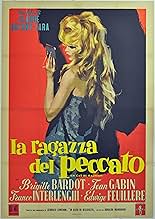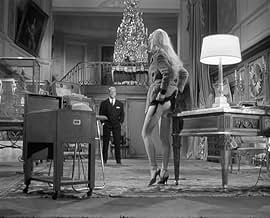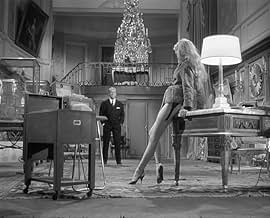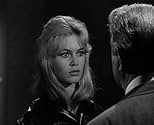En cas de malheur
- 1958
- 2 घं 2 मि
IMDb रेटिंग
6.7/10
1.7 हज़ार
आपकी रेटिंग
अपनी भाषा में प्लॉट जोड़ेंMarried French lawyer Andre defends succesfully the case of Yvette, who committed a robbery. He falls in love with her, but she isn't true to him.Married French lawyer Andre defends succesfully the case of Yvette, who committed a robbery. He falls in love with her, but she isn't true to him.Married French lawyer Andre defends succesfully the case of Yvette, who committed a robbery. He falls in love with her, but she isn't true to him.
- पुरस्कार
- कुल 1 नामांकन
Georges Seey
- Le bijoutier
- (as Georges Scey)
फ़ीचर्ड समीक्षाएं
Gorgeous Brigitte Bardot is perfect as the mixed-up, spoiled young woman carrying on with an older attorney (Jean Gabin)who sets up her own fate. Mr. Gabin has always been a marvelous actor with a commanding presence at all times. Nice music and cinematography, but it's Ms. Bardot who makes it worthwhile. Beside her looks and sex appeal, her personality always shines through and she seems very comfortable on screen, even at a young age.
A 7 out of 10. Best performance = B. Bardot. You never quite knew where this film was going to end up, but it reaches a touching ending of closure for all concerned.
A 7 out of 10. Best performance = B. Bardot. You never quite knew where this film was going to end up, but it reaches a touching ending of closure for all concerned.
Brigitte Bardot et amie invade a jeweler's shop and rob him. While they are doing so, a woman enters and complicates matters, so they knock her out. She may die. The friend is picked up, and Bardot heads to the well known defense lawyer, Jean Gabin. She has no money, so she raises her skirts. Gabin says nothing, gets her off, and then they begin an affair. Gabin is married to Edwige Feuillère. Bardot sleeps around, but says she loves Gabin, even as she has regular horizontal sessions with communist medical student Claude Magnier.
It's a last flare of Pepe Le Moko for Gabin. He's no longer the young criminal. He's older. He's solid. He's married, and Bardot is his last chance for.... if not love, then sexual obsession. Yet director Claude Autant-Lara is no poetic realist. The sexuality of his characters is not cloaked in symbols. It's Bardot walking around naked for a few seconds, it's Bardot and Magnier wearing the same sweater. To show they are linked.... and they must comment on it. There's no need for the audience to dig, it's all laid out for them, and as a result, it's less involving. The performances are great, but without the confidence of the director, there is no magic.
It's a last flare of Pepe Le Moko for Gabin. He's no longer the young criminal. He's older. He's solid. He's married, and Bardot is his last chance for.... if not love, then sexual obsession. Yet director Claude Autant-Lara is no poetic realist. The sexuality of his characters is not cloaked in symbols. It's Bardot walking around naked for a few seconds, it's Bardot and Magnier wearing the same sweater. To show they are linked.... and they must comment on it. There's no need for the audience to dig, it's all laid out for them, and as a result, it's less involving. The performances are great, but without the confidence of the director, there is no magic.
A film with legends Jean Gabin and Brigitte Bardot that starts off strong, but lags considerably after the first 40 minutes or so. Bardot plays a desperate woman who tries to rob a jeweler with her friend, but things go south and she ends up hammering an old woman with a crowbar. She turns to a lawyer (Gabin) and offers herself to him in exchange for him defending her. He has to knowingly violate the law to do so, so there are some pretty subversive elements to this film. One character says "In hunger, you can do what you like, and afterwards you mustn't feel ashamed," justifying the violent crime. In addition to Bardot hiking up her skirt and later capering about naked after a bath, it openly references adultery, abortion, female sexual desire, and a ménage à trois with the maid. The lawyer's beautiful wife (Edwige Feuillère) is fully aware of what her husband is up to and in one scene drops him off at his lover's hotel. She accepts his indiscretions but with painful reservations, and Feuillère is fantastic in her scenes - I wish there had been more of them. The lawyer's assistant (Madeleine Barbulée) is also an interesting, but underused character.
Where the film goes with the setup is to show that Bardot's character is in some ways just like Gabin's - she likes sex, and wants to have it both ways. She carries on with other men after he sets her up in an apartment as a "kept" woman, and one of them (Franco Interlenghi) gets obsessively attached. The film has her ping-ponging between the two of them as they grow successively more jealous of each other, and unfortunately many of the scenes lack sizzle and are too drawn out. Gabin is too stiff and dour throughout the film, especially when he's with Bardot. He's only 54 here but he seems tired, except when he's explaining to his wife the situation and the two grow animated. Overall the film's editing in the back half should have matched what we see early on, and it probably should have been much shorter than 117 minutes. Towards the end I didn't care what was going to happen to these characters, and found the ratcheted up music tiresome.
Where the film goes with the setup is to show that Bardot's character is in some ways just like Gabin's - she likes sex, and wants to have it both ways. She carries on with other men after he sets her up in an apartment as a "kept" woman, and one of them (Franco Interlenghi) gets obsessively attached. The film has her ping-ponging between the two of them as they grow successively more jealous of each other, and unfortunately many of the scenes lack sizzle and are too drawn out. Gabin is too stiff and dour throughout the film, especially when he's with Bardot. He's only 54 here but he seems tired, except when he's explaining to his wife the situation and the two grow animated. Overall the film's editing in the back half should have matched what we see early on, and it probably should have been much shorter than 117 minutes. Towards the end I didn't care what was going to happen to these characters, and found the ratcheted up music tiresome.
I have no doubt that every cinephile has his or her own favourite adaptation of the prolific Belgian novelist Georges Simenon. This is certainly one of mine. It is directed by Claude Autant-Lara whose last great film this was before his downward curve. Jean Gabin had long since ceased to play the underdog pursued by implacable fate and here gives a faultless performance as a well-heeled, world-weary and somewhat shady lawyer. Brigitte Bardot, in probably her best role, is the tantalising coquette with whom he becomes infatuated. Bardot herself was dismissive of most films in her career, understandably so, although I would be very surprised if this were one of them. The film is beautifully shot by Jacques Nattau with an excellent score by the director's favoured composer Rene Cloerec. Mention must be made of the divine Edwige Feuiliere, one of the greatest actresses of her generation. In one of her best film roles of the 1950's she is tremendous as the wife who turns a blind eye to her husband's peccadilloes. Her character's attitude typifies the thin dividing line between complacency and complicity. As one would expect from this director this is a well-crafted and deeply cynical piece about the frailties of human nature and is one of those films that really gets under the skin.
The film under review closes off nicely Claude Autant-Lara's impeccable 15-year run of noteworthy pictures that had begun with 1943's DOUCE (see my upcoming rave review); it is also notable for being an unlikely but fairly successful meeting between the biggest (Jean Gabin) and hottest (Brigitte Bardot) stars in French Cinema at the time i.e. just before the outbreak of the "Nouvelle Vague" brought along a horde of fresh and irreverent talent. Adapted from a Georges Simenon novel, the plot of EN CAS DE MALHEUR is quite predictable and not entirely convincing but the consummate professionalism of all concerned smooths over any bumps that come up along the way. Bardot is an aimless youth who, together with her reluctant girlfriend, amateurishly attempts to pull off a small-time jewel heist that, inevitably, goes wrong and, eventually, picks up Gabin's name at random from a phone book to act as her defense counsel in court; not having the financial means to pay for his services, she elects to remunerate him in the only way she knows how: seduction. Although this particular sequence, as shown in the finished film, is disappointingly chaste, the deleted clip reproduced at the end of the copy I acquired is, however, too crude to be seen at such an early stage of the film and, in my opinion, the director was wise to jettison it; in any case, he did contrive to gives us a good look at the gloriously naked body (solely from the back, of course) of the 23-year old Bardot later on when she rushes out of the bathroom and into bed (much to the chagrin of Gabin's mousy secretary) of the apartment that Gabin provided her with! Needless to say, Gabin is already married (to the formidable Edwige Feuilliere) and, although on the surface she appears to condone Gabin's latest flirtation, she is obviously none too happy about it. To complicate matters further, Bardot is also seeing her irascible Italian lover (Franco Interlenghi) on the side and things come to a tragic head when she unwisely decides that loveless wealth is preferable to blissful poverty. Abetted by Jacques Natteau's noir-ish lighting and Rene' Cloerec's fine score, the colorful cast also includes three alumni from the films of Luis Bunuel, namely Julien Bertheau (appearing briefly at the very end as the investigating inspector at the scene of the crime passionel), Jean-Pierre Cassel (unbilled as an animated trumpeter, one of Bardot's casual lovers) and an unrecognizable Bernard Musson – and even Jacques Marin and Daniela Bianchi (also unrecognizable). While the film's 122-minute running time would seem overgenerous on paper, it is only the belated (and unnecessary) introduction of the character of Bardot's maid that makes one realize this as we lay watching; I strongly suspect that the film-makers wanted to push the boundaries of censorship even further by hinting at a possible ménage-a-trois between her, Bardot and Gabin but, perhaps thankfully, this is not made all that clear in the few scenes they share together
which is just as well since the huge difference in age between on screen lovers Gabin and Bardot and the above-mentioned nude scene had already raised the proverbial conservative eyebrows! For the record, the film was remade 40 years later as EN PLEIN COEUR aka IN ALL INNOCENCE with Virginie Ledoyen stepping into Bardot's 'shoes'.
क्या आपको पता है
- ट्रिवियाDaniela Bianchi's debut.
- भाव
Maître André Gobillot: It was hard. I had to make it simple. That's the hard part. See?
- कनेक्शनEdited into Histoire(s) du cinéma: Seul le cinéma (1994)
टॉप पसंद
रेटिंग देने के लिए साइन-इन करें और वैयक्तिकृत सुझावों के लिए वॉचलिस्ट करें
- How long is Love Is My Profession?Alexa द्वारा संचालित
विवरण
- रिलीज़ की तारीख़
- कंट्री ऑफ़ ओरिजिन
- भाषा
- इस रूप में भी जाना जाता है
- Love Is My Profession
- फ़िल्माने की जगहें
- उत्पादन कंपनियां
- IMDbPro पर और कंपनी क्रेडिट देखें
बॉक्स ऑफ़िस
- बजट
- $7,50,000(अनुमानित)
- दुनिया भर में सकल
- $49,454
- चलने की अवधि2 घंटे 2 मिनट
- रंग
- पक्ष अनुपात
- 1.66 : 1
इस पेज में योगदान दें
किसी बदलाव का सुझाव दें या अनुपलब्ध कॉन्टेंट जोड़ें





























